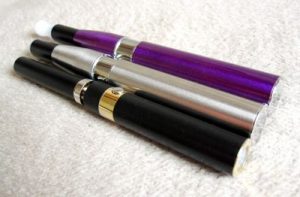American Heart Association Wants Electronic Cigarettes to Be Regulated as Tobacco Cigarettes
The American Heart Association has released its first policy statement on electronic cigarettes. In it, the group expresses great concern about the rapidly-growing popularity of electronic cigarettes and urges the FDA to regulate them as soon as possible.
 “Recent studies raise concerns that e-cigarettes may be a gateway to traditional tobacco products for the nation’s youth and could renormalize smoking in our society,” the AHA wrote in its flagship journal, Circulation. “These disturbing developments have helped convince the association that e-cigarettes need to be strongly regulated, thoroughly researched, and closely monitored.” One of the studies they referred to was conducted by the CDC and found that three times more non-smoking teens tried electronic cigarettes in 2013 than in 2011. The research also reports that 43.9% of young people who tried e-cigarettes said they intended to try conventional cigarettes in the following year, compared to 21.5% of those who had never tried e-cigs.
“Recent studies raise concerns that e-cigarettes may be a gateway to traditional tobacco products for the nation’s youth and could renormalize smoking in our society,” the AHA wrote in its flagship journal, Circulation. “These disturbing developments have helped convince the association that e-cigarettes need to be strongly regulated, thoroughly researched, and closely monitored.” One of the studies they referred to was conducted by the CDC and found that three times more non-smoking teens tried electronic cigarettes in 2013 than in 2011. The research also reports that 43.9% of young people who tried e-cigarettes said they intended to try conventional cigarettes in the following year, compared to 21.5% of those who had never tried e-cigs.
The AHA also expressed its concern regarding the effects electronic cigarettes might have on blood vessels and pregnant women, although there is yet no scientific evidence to back these fears. “There are many things we see as dark clouds on the horizon”, the heart Association’s president, Dr. Elliot Antman, said about e-cigarette’s effect on human health.
According to the new policy statement, electronic cigarettes should be regulated as tobacco products by the Food and Drug Administration and discouraged as a primary smoking cessation option. Aruni Bhatnagar, lead-writer of the policy and a professor of medicine at the University of Louisville, in Kentucky, told Bloomberg that e-cigarettes should only be used as a last resort. “If people cannot quit at all and have tried everything in the field, we would not discourage them. It’s not something that we would suggest.” President Antman agrees that a “it is reasonable to have a conversation about e-cigarettes” only when all other recommended smoking cessation means fail.
Although the American Heart Association acknowledges that electronic cigarette vapor is likely to be much less toxic than cigarette smoke – a fact already confirmed by several scientific studies – it feels that users should be aware that unregulated e-liquid may contain low level of toxic chemicals. Furthermore, it stresses that e-cigarettes have not been proven as smoking cessation products. They should probably check the pioneering clinical study conducted last year that showed electronic cigarettes are at least as effective as nicotine patches in helping smokers quit.
In its policy statement, the AHA argued that because e-cigarettes contain nicotine, they are tobacco products and should be subject to all laws that apply to this category. However, on their website, the group encourages smokers to use various nicotine-containing products to help them quit the habit. I’m not saying e-cigarettes should be treated as medical products instead – that would be even worse – just the presence of nicotine doesn’t automatically make electronic cigarettes tobacco products.
Unfortunately, it seems the AHA’s statement is based less on scientific evidence and legitimate health concerns and more on its desire to be against anything tobacco companies are involved in. “Over the last 50 years, 20 million Americans died because of tobacco. We are fiercely committed to preventing the tobacco industry from addicting another generation of smokers,” Nancy Brown, CEO of the American Heart Association, wrote in the document. As you know, Big Tobacco stopped opposing e-cigarettes a long time ago, and actually started investing heavily in the sector, in an attempt to eventually take control of it as well. Perhaps the simple involvement of the tobacco industry has convinced the AHA that electronic cigarettes are bad and should be dealt with the same way as conventional cigarettes.
Sources: Mashable, Science 2.0, Bloomberg
















